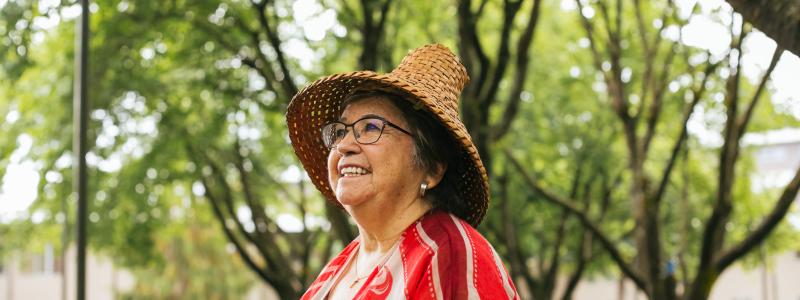During Indigenous History Month in June, and in recognition of Indigenous Peoples Day on June 21, Trinity Western University joins people across Canada in honouring the rich history, heritage, resilience, and diversity of First Nations, Inuit, and Métis.
From time immemorial, all campuses of Trinity Western University are home to the Indigenous peoples.
University land acknowledgements
We acknowledge that TWU’s Langley main campus is located on the traditional ancestral unceded territory of the Stó:lō people. TWU’s Richmond campus is located on the traditional ancestral unceded territory of the Musqueam people, and TWU’s Laurentian Leadership Centre in Ottawa is located within the traditional ancestral unceded territory of the Algonquin people.
Learn more about land acknowledgement at TWU.
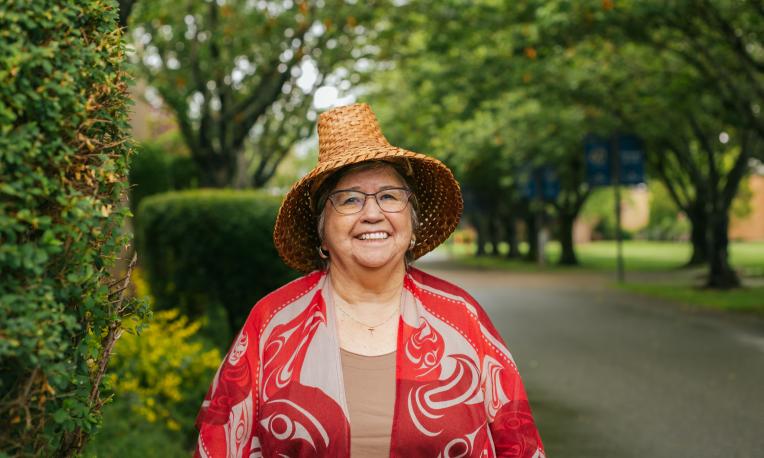
“(We) tell our own stories of the significant places…so that we have not just a Trinity Western history, but also the Indigenous history of the land where we’re located."
Siyá:m is a leader recognized for wisdom and integrity
TWU is grateful for the work of Patricia Victor Switametelót, who has provided leadership as TWU's University Siyá:m since 2012. Victor is Stó:lō and a member of Xwchíyò:m (Cheam) First Nation, B.C. She is also the pastor of a First Nations church in Chilliwack and an ordained minister with the Pentecostal Assemblies of Canada.
In the language of the Stó:lō people, Siyá:m describes a leader recognized for wisdom and integrity, who willingly shares knowledge with others.
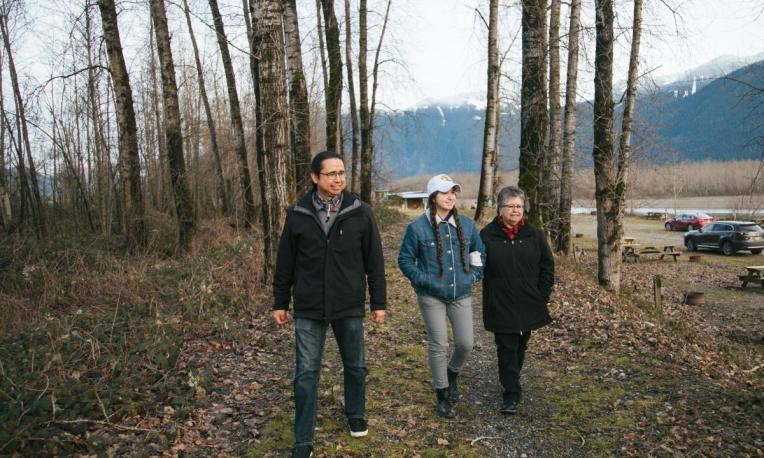
TWU is grateful for the work of Patricia Victor Switametelót, who has provided leadership as TWU's University Siyá:m since 2012. As University Siya:m, Victor leads TWU students, staff, faculty, and researchers to better understand the Stó:lō land and context where Trinity Western University was founded.
University Siyá:m receives ancestral name, Switametelót
In November 2022, Patricia Victor received her ancestral name, Switametelót. The name Switametelót was gifted to Victor's great-grandmother from her father Switamet. For decades, the name Switametelót had been buried through the effects of colonization. Five generations later, Victor has reclaimed her family name and re-established her family's connection to Squiala, her great grandfather’s traditional territory.
In November 2022, Patricia Victor received her ancestral name, Switametelót.
The name Switametelót was gifted to Victor's great-grandmother from her father Switamet.
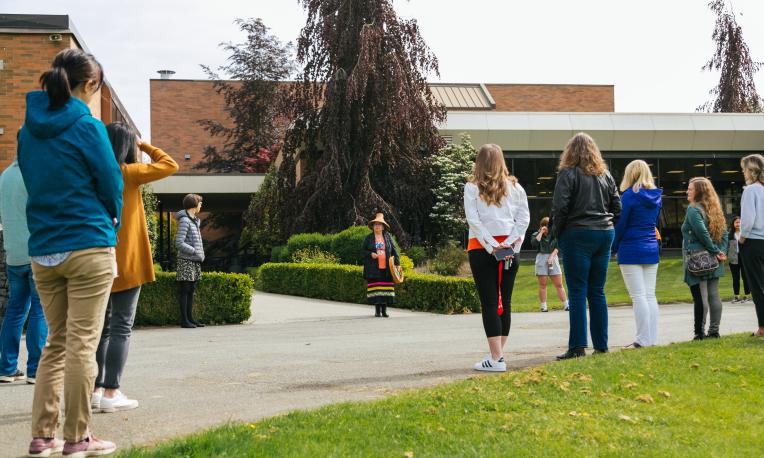
Understanding the Stó:lō land and context
As University Siya:m, Victor leads TWU students, staff, faculty, and researchers to better understand the Stó:lō land and context where Trinity Western University was founded in 1962.
Victor’s role as University Siyá:m has four main areas of focus: to raise awareness of Indigenous perspectives among the TWU community and to connect Indigenous ways of knowing and being in teaching and learning; to care for Indigenous students through coaching and mentoring and creating opportunities for holistic wellness supports that are culturally relevant; to cultivate a culture of walking together in a good way with all students, faculty and staff at TWU; and building Indigenous partnerships and relationships beyond TWU’s campuses.
“We’re listening to the stories of the Stó:lō people."
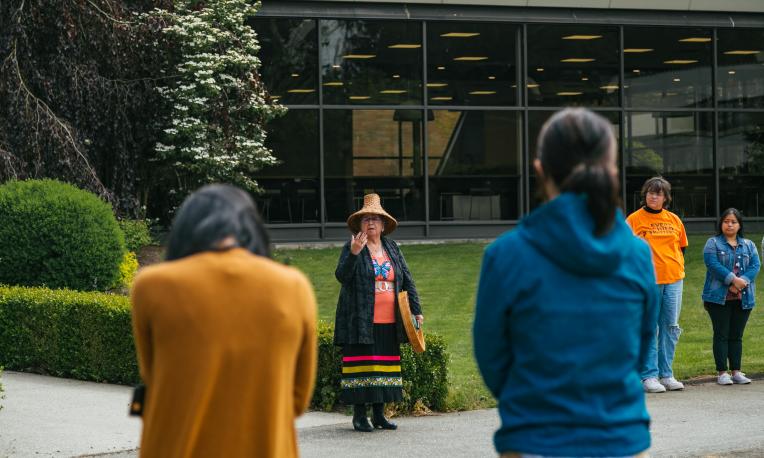
Listening to the stories of the Stó:lō people
Speaking on the Stó:lō land and context, Victor explains, “Stó:lō means river. We are walking beside the Fraser River, hearing stories and history. (We are) looking at the current context, and at what we’re doing today that is having an impact on Stó:lō people.”
“We’re listening to the stories of the Stó:lō people,” Victor continues. This listening is done year-round through many gatherings, classes, activities, and forums. One example is the Resurgence! Indigenous speaker series, and the campus-wide Day of Learning that has been hosted at TWU for two years in a row on September 30, the National Day for Truth and Reconciliation.
Through these projects, she is helping TWU researchers to better understand and appreciate Indigenous history and environment.
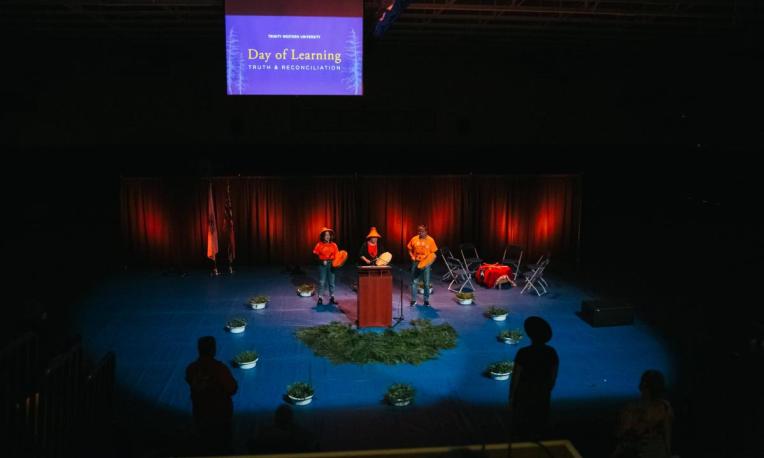
Walking the Stó:lō lands
Victor also participates in several TWU research projects that foster Indigenous perspectives. Through these projects, she is helping TWU researchers to better understand and appreciate Indigenous history and environment.
One project focused on leading research teams to visit Cheam First Nation and walk the Stó:lō lands. “I wanted them to walk (the land) themselves and get a feel for it, its history. That’s all part of building relationships within our own community,” Victor said. Through walking the lands together, Victor helps the TWU community to “look at Stó:lō as part of their sustenance.” Victor further works with B.C. Fraser River fishing authorities, scientists and biologists, as well as Indigenous chiefs and councils who oversee the territories that they walk through.
Through walking the lands together, Victor helps the TWU community to “look at Stó:lō as part of their sustenance.”
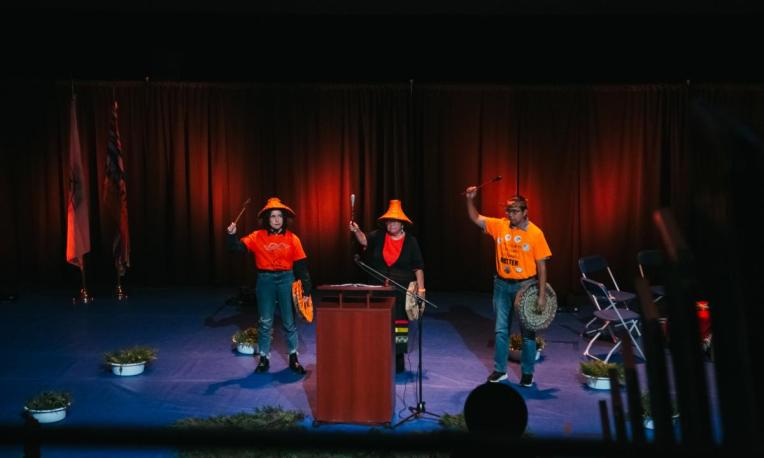
Walking alongside Indigenous students
Another key area of focus for Victor is caring for TWU students. For students, she fosters culturally-appreciative ways of being together and of mutual encouragement.
As Victor notes, “Equally important is that our Aboriginal students are fully supported, not just academically, and not just spiritually…not (even) just physically, but also culturally."
She describes what it looks like to walk alongside students. “Sometimes it’s just being a listening ear. Sometimes it’s praying with a student.”
“Equally important is that our Aboriginal students are fully supported, not just academically, and not just spiritually…not (even) just physically, but also culturally."
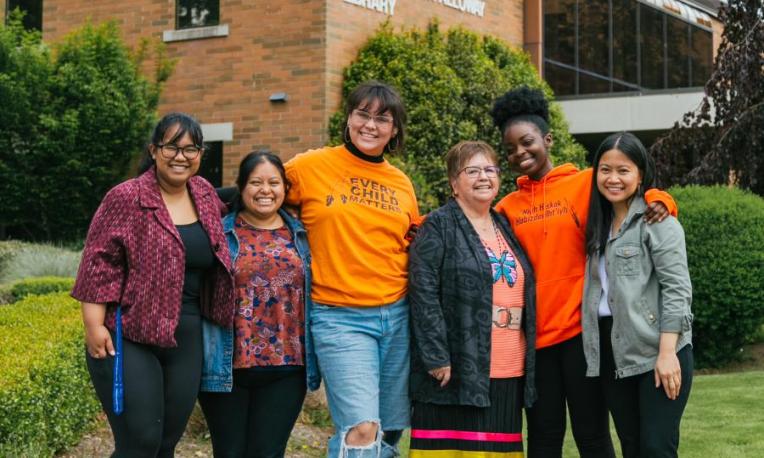
“Sometimes it’s walking with them in their circumstances, not just academically, but for things that are happening within their own lives, within their own community,” she adds. “(It’s about) being that support person while they’re away from home.”
Part of student care is also providing educational opportunities for non-Indigenous students who are interested to learn more about Indigenous perspectives, and Indigenous ways of knowing and being. Victor creates spaces to bring people together, “so that we continue living and growing and developing relationship.”
Being relationship driven
Throughout her work, Victor prioritizes people. “My role and my passion is just to walk with people where they’re at, and build those good relationships,” she said in describing her approach.
In fact, when Victor leads meetings, she does it in a surprisingly different way. “It is not agenda driven; it’s relationship driven,” she explains. “When we gather, we gather to know each other. And then you can do the business of the day.”
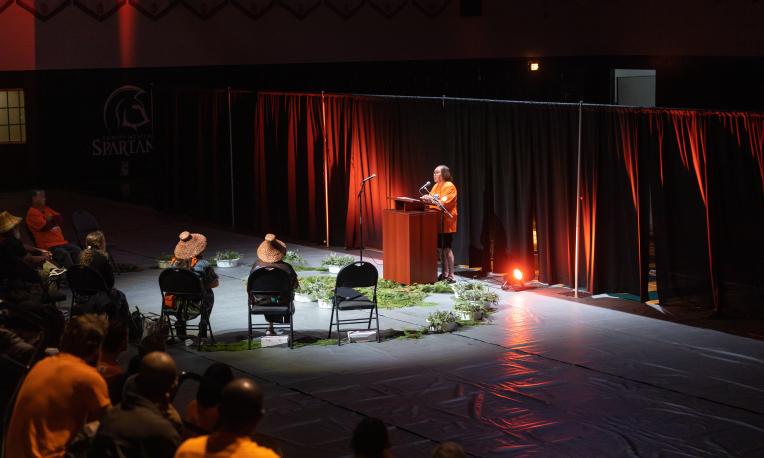
Victor notes that this approach matches Jesus’ way of relating. “He’s interested in having relationship with us, and out of relationship, we do the work that he sets before us. That’s how we need to relate to one another as people,” she said.
She sees this relational foundation as valuable for the University. “My belief is that that is how we should be doing the work in the University as well. It’s God-honouring,” she said. “It provides respect and dignity to everyone that is in your space, and for that moment. That honours God.”
The founding of TWU's Indigenous Partnership Council
Victor’s journey at TWU began when she was a graduate student, pursuing a Master of Arts in Leadership with a focus on Christian ministry.
While pursuing graduate studies at TWU, Victor was invited to join a TWU task force whose purpose was to build good relationships with the Indigenous community.
Together with the task force, Victor worked alongside TWU faculty, staff and students to help the University to better serve Indigenous students, and to bring in supportive resources for them. This task force eventually became TWU’s Indigenous Partnership Council, and their work continues today.
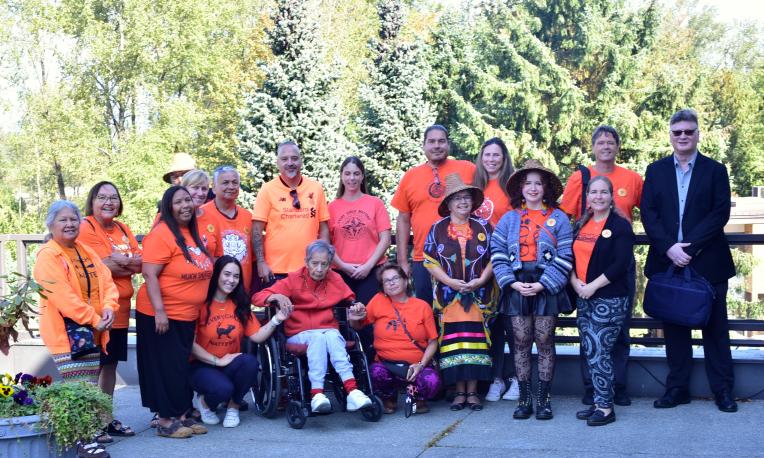
TWU’s nursing and teaching practicums within Indigenous communities
Over the years, Victor's efforts have helped to build educational partnerships between TWU and Indigenous communities.
These partnerships have enabled the School of Nursing to connect students with opportunities to fulfill their practicums within Stó:lō Indigenous communities. The School of Education also has partnerships with Indigenous schools, and places TWU students within Indigenous classrooms for teaching practicums. “We’ve had good opportunity there,” said Victor about TWU's nursing and educational partnerships.
Learning together, overcoming barriers
All throughout the year, Victor supports the TWU community in walking towards Indigenous reconciliation. She leads on-campus events to remember missing and murdered Indigenous women and girls. These gatherings encourage students to be educated about needs and injustices in society, to pray and to reflect. She challenges students, staff, and faculty to consider “how to personally take a look at making changes in our own attitude and heart.”
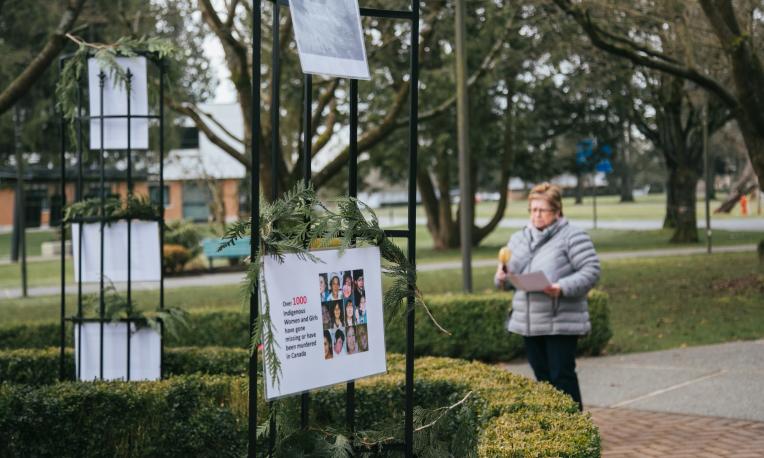
She has further provided opportunities for students to experience Indigenous gatherings on campus and to see past the stereotypes about Indigenous ceremonies. “People came and experienced the tearing down of old barriers because of colonization and fear and ignorance,” she said.
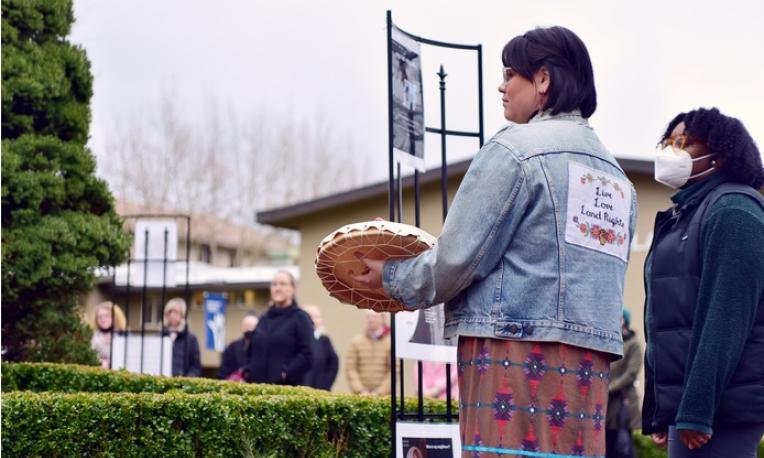
Beyond her work at TWU, Victor often speaks to Christian schools about Indigenous perspectives, and she is regularly invited to be a speaker at various conferences.
All of these efforts are ways in which Victor and others at TWU are helping build relationships and partnerships with Indigenous communities. Victor sees these partnerships as key to moving forward. “So it’s not just ‘us and them’ but that solid relationship,” she said.
See also: Kathleen Lounsbury integrates Indigenous knowledge into TWU's curriculum
About Indigenous Initiatives at TWU
As a global Christian university, TWU continues to foster greater knowledge and understanding of Indigenous cultures, worldview, and history among students, staff, and faculty. We do this by providing educational opportunities, engaging in community partnerships, and through caring for and supporting Indigenous students. Learn more about Indigenous Initiatives at TWU.
About Trinity Western University
Founded in 1962, Trinity Western University is Canada’s premier Christian liberal arts university dedicated to equipping students to establish meaningful connections between career, life, and the needs of the world. It is a fully accredited research institution offering liberal arts and sciences, as well as professional schools in business, nursing, education, human kinetics, graduate studies, and arts, media, and culture. It has four campuses and locations: Langley, Richmond-Lansdowne, Richmond-Minoru, and Ottawa. TWU emphasizes academic excellence, research, and student engagement in a vital faith community committed to forming leaders to have a transformational impact on culture. Learn more at www.twu.ca or follow us on Twitter @TrinityWestern, on Facebook and LinkedIn.
For media inquiries, please contact: media@twu.ca
This article includes a prior interview with Patricia Victor first published June 18, 2021.

